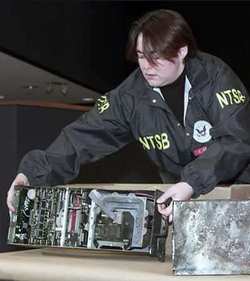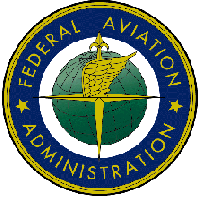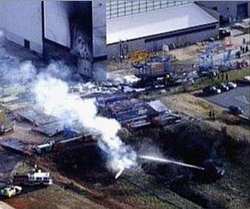NTSB Also Looking Closely At Weight/Balance
 Was it poor maintenance? Was there a problem with
overloading or shifting luggage? Three and a half months after US
Airways Express Flight 5481 slammed into a hangar on take-off at
Charlotte/Douglas International Airport in Charlotte (NC), the NTSB
continues plodding through its investigation, methodically
searching for answers to those questions and more.
Was it poor maintenance? Was there a problem with
overloading or shifting luggage? Three and a half months after US
Airways Express Flight 5481 slammed into a hangar on take-off at
Charlotte/Douglas International Airport in Charlotte (NC), the NTSB
continues plodding through its investigation, methodically
searching for answers to those questions and more.
5481 plowed into parking lot and a maintenance hangar just
seconds after takeoff Jan. 8 from Charlotte/Douglas. The NTSB is
now looking at the plane's weight with shifting baggage and
problems with a horizontal tail surface as possible contributing
factors in the mishap. All 21 people on board the Beech 1900 were
killed when the aircraft impacted the ground.
Who's Job Was This Anyway?
 But the demise of 5481 has brought up questions
about what some observers call the uncommon contract maintenance
arrangement that Air Midwest, which flew the plane for US Airways,
had for the Beech 1900 turboprop.
But the demise of 5481 has brought up questions
about what some observers call the uncommon contract maintenance
arrangement that Air Midwest, which flew the plane for US Airways,
had for the Beech 1900 turboprop.
The NTSB will "most certainly" look at the maintenance
arrangement in its crash investigation, the Charlotte Observer
reported Sunday, citing a source familiar with the
investigation.
The NTSB said the flight control cables on the commuter aircraft
were improperly adjusted two days before the crash during work
performed at a hangar in Huntington (WV).
Air Midwest contracted with Raytheon Aerospace LLC to maintain
its planes. In turn, Raytheon contracted with Structural,
Modification and Repair Technicians Inc. of Edgewater, Fla., to
provide staff. The shop had been open for six months and employed
about a dozen people at the time of the tragedy.
The Blame Game: Musical Chairs
The management structure is unusual because the FAA allowed the
hangar to operate under Air Midwest's operating certificate, but
other companies provided all but one of the workers.
 Federal regulations say Air Midwest was responsible for
maintenance. It's unclear how closely Air Midwest monitored the
maintenance work performed by the other companies.
Federal regulations say Air Midwest was responsible for
maintenance. It's unclear how closely Air Midwest monitored the
maintenance work performed by the other companies.
Air Midwest, Raytheon and the Florida company have repeatedly
declined to comment on issues related to the investigation.
A key question is whether the sequence of events that preceded
the crash would have happened at a more traditional airline
maintenance hangar, where the airline's permanent mechanics have
their work overseen by a safety inspector who has few additional
responsibilities.
The mechanic who adjusted the flight-control cables on the
turboprop was working on a Beech 1900 for the very first time, the
Observer reported. He expected an inspection by his supervisor, who
were both hired through the Florida company. Whether the inspection
ever occurred is part of the investigation.
Is It Safe To Farm Out Such Work?
 The FAA should require that airlines retain the
role of inspector when they contract out for maintenance, said Jim
Burnett, NTSB chairman from 1982 to 1988.
The FAA should require that airlines retain the
role of inspector when they contract out for maintenance, said Jim
Burnett, NTSB chairman from 1982 to 1988.
"The FAA should say it's the responsibility of the airline, and
not allow them to delegate that to anyone," Burnett said.
Third-party maintenance companies now do about half of all
maintenance work for airlines in this country. In 2001, major
carriers spent $2.9 billion for outsourced aircraft maintenance -
$1.3 billion more than they spent five years before, according to
the DoT IG. The inspector general's office is now examining the
FAA's oversight of third party repair stations.
Why Contract?
Sending aircraft maintenance work out of house allows airlines
to sidestep costly union contracts. Some airline experts say it has
become tougher for airlines to ensure the quality of maintenance
work when the mechanics are so far removed from the corporate
structure of the airline itself.
"The more removed you get from the maintenance, the more
training it takes," says Sarah MacLeod, executive director of the
Aeronautical Repair Station Association, a group that represents
repair shops.
 Bolen Gives Congress a Rare Thumbs-Up
Bolen Gives Congress a Rare Thumbs-Up The SportPlane Resource Guide RETURNS!!!!
The SportPlane Resource Guide RETURNS!!!! Buying Sprees Continue: Textron eAviation Takes On Amazilia Aerospace
Buying Sprees Continue: Textron eAviation Takes On Amazilia Aerospace Hawker 4000 Bizjets Gain Nav System, Data Link STC
Hawker 4000 Bizjets Gain Nav System, Data Link STC Echodyne Gets BVLOS Waiver for AiRanger Aircraft
Echodyne Gets BVLOS Waiver for AiRanger Aircraft






